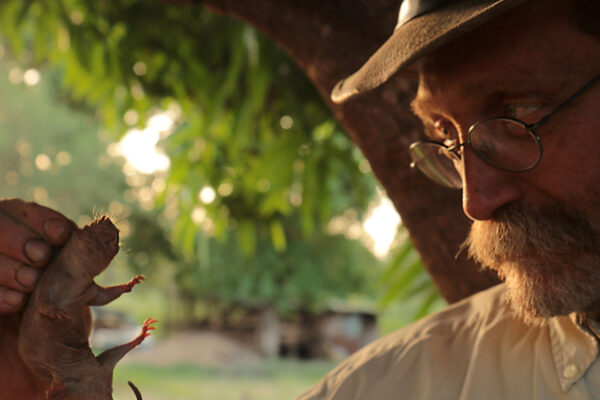Tracking the migration of a naked mole rat
Stan Braude, a biologist in Arts & Sciences, published a new study in the African Journal of Ecology that considers the role of the moon in driving a particularly rare occurrence: the solo journey of a naked mole rat from one underground colony to start a new one.
Film festival brings authentic African stories to Washington University March 22-24
The eighth annual African Film Festival at Washington University in St. Louis will feature award-winning African films and filmmakers March 22-24. Organizers say the festival exposes the St. Louis community to “African stories as told by Africans,” helping to dispel stereotypes about Africa. All film showings, which are free and open to the public, take place in Brown Hall, Room 100, on the university’s Danforth Campus.
Ob/gyn’s dream for women’s hospital in Africa comes true
For Lewis Wall, MD, professor of obstetrics and gynecology at Washington University School of Medicine in St. Louis, a dream has come true. For almost 20 years, he worked doggedly to build a hospital in one of the world’s poorest countries to treat women with a devastating childbirth injury. His dream became reality in February, when a 42-bed hospital opened in Niger, Africa. The facility is dedicated to repairing fistulas, wounds inflicted by prolonged labor, which leaves women — and often girls — steadily leaking wastes.
Oct. 5 conference to focus on global health
The Institute for Public Health at Washington University in St. Louis will host its fourth annual conference, titled “Beyond Borders: Transforming Health at Home & Abroad,” from 12:30 to 5 p.m. Wednesday, Oct. 5, at the Eric P. Newman Education Center on the Medical Campus.
Brown School student gives firsthand account of rural life in drought-ridden Africa
According to the United Nations, nearly 10 million people in Africa are experiencing one of the worst droughts in 60 years. Drought conditions are now leading to famine. Michael Galvin, a second-year student at the Brown School at Washington University in St. Louis, is in the east African countryside as part of a team testing the effectiveness of KickStart, a social enterprise selling low-cost technologies such as irrigation pumps to help alleviate poverty. Galvin is blogging about the farmers and families he and team members are visiting through stories, video and photos (http://kickstartblog.wordpress.com/ ). His entries give a powerful look at how the drought is impacting lives.
Former ambassador for counternarcotics and justice reform in Afghanistan available to discuss foreign policy priorities for President Obama
“Afghanistan, Iraq and Pakistan need to be top foreign policy priorities for President Barack Obama,” says Thomas Schweich, former ambassador for counternarcotics and justice reform in Afghanistan and visiting professor of law at Washington University in St. Louis. Schweich, the Special Representative for Mexico, Central America, and the Caribbean for the United Nations Office on Drugs and Crime, is available to discuss foreign policy issues facing the next president.
Fighting poverty in Madagascar
Women from Mahabo Village in Madagascar weaving baskets for the Blessing Basket Project.It might seem odd that college students in the middle of the United States could make a difference to a small village in a developing country halfway around the world, but that’s exactly what happened when five students from Washington University in St. Louis went to Madagascar. More…
Nobel laureate Arrow to discuss economics of malaria
Malaria, along with tuberculosis and HIV/AIDS, is one of the three largest global killers of the world’s poorest people.
Nobel Laureate Kenneth Arrow discusses economics of new malarial drugs, Oct. 21
Nobel Laureate Kenneth J. Arrow will discuss “The Economics of New Antimalarial Drugs” at 2:30 p.m. Oct. 21 in the Bryan Cave Courtroom, Anheuser-Busch Hall. Arrow, a longtime professor of economics at Stanford University, recently chaired a National Institute of Medicine committee that issued a report titled “Saving Lives, Buying Time: Economics of Malaria Drugs in an Age of Resistance.” Malaria, along with tuberculosis and HIV/AIDS, is one of the big three global killers of the world’s poorest people.
New fossils from Ethiopia open a window on Africa’s ‘missing years’
Image by Trent L. Schindler, Nat’l Science Foundation, Arlington, VAComputer-based reconstruction of an arsinoithere, an extinct fossil mammal from Ethiopia that lived 27 million years ago.Tab Rasmussen, Ph.D., a professor of anthropology in Arts & Sciences at Washington University, and two of his graduate students, were part of an international team of researchers that discovered new fossils in the highlands of Ethiopia that are filling gaps in scientists’ understanding of the evolution of African mammals. The results are reported in the Dec. 4, 2003, issue of the journal Nature.
View More Stories

